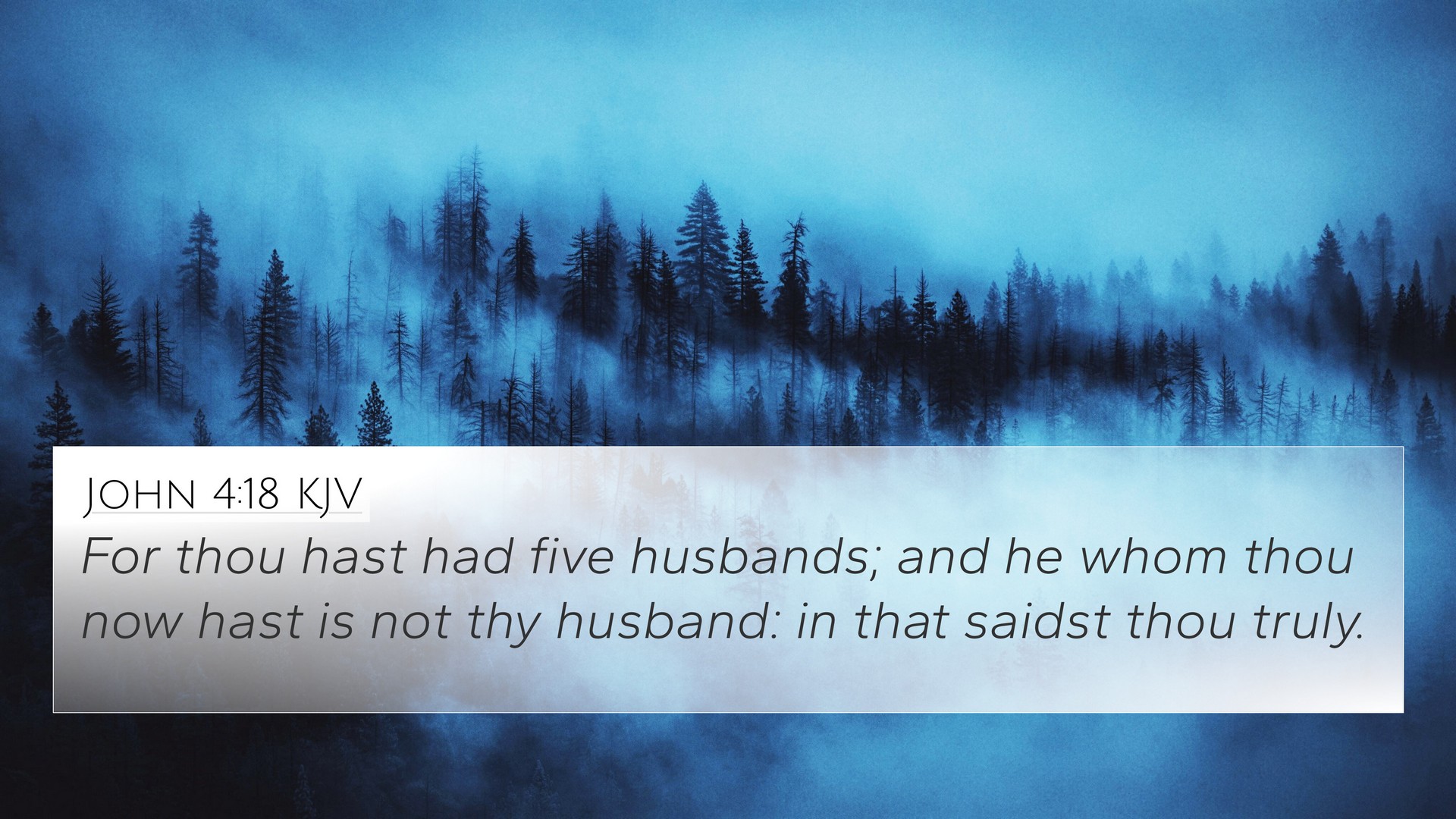Understanding John 4:18
Bible Verse: John 4:18 - "For you have had five husbands, and the one whom you now have is not your husband; in that you spoke truly."
This verse is part of a significant encounter between Jesus and the Samaritan woman at the well. The passage speaks to themes of truth, revelation, and personal transformation. Below, we will explore the interpretations and insights derived from notable public domain commentaries, including those by Matthew Henry, Albert Barnes, and Adam Clarke.
Commentary Insights
Matthew Henry’s Commentary
Matthew Henry emphasizes the profound nature of Jesus' knowledge in this encounter. He highlights that Jesus, through supernatural insight, exposes the woman's history and present struggle. This revelation serves not to condemn her but rather to lead her towards a greater understanding of who He is, thus inviting her to embrace the truth of salvation.
Albert Barnes’ Notes on the Bible
Albert Barnes points out the significance of Jesus’ statement regarding the woman's marital history. He notes that the five husbands represent a deeper spiritual reality of dissatisfaction and unfulfilled longing that can only be resolved through accepting Christ. Barnes remarks that the current situation—living with a man who is not her husband—symbolizes the emptiness of seeking fulfillment outside the covenant of God.
Adam Clarke’s Commentary
Adam Clarke presents a contextual analysis, illustrating how this conversation reveals societal issues pertaining to women in that era. He notes the gravity of the woman’s lifestyle and how Jesus’ approach indicates His willingness to engage with those marginalized by society. Clarke expresses how this interaction exemplifies Christ’s mission to seek and save the lost, providing hope for redemption.
Thematic Analysis
The verse covers several key themes:
- Revelation: Jesus openly discusses the woman's past, which serves as a testament to His divine insight.
- Grace and Forgiveness: The encounter signifies that regardless of one’s past, redemption through Christ is available.
- Truth: The importance of speaking truthfully is underscored in the dialogue between Jesus and the woman.
- Personal Transformation: The acknowledgment of one’s past is the first step towards spiritual renewal.
Cross-References Related to John 4:18
Below are some biblical verses that provide beneficial cross-references for deeper understanding:
- John 8:32: "And you will know the truth, and the truth will set you free."
- Matthew 5:32: "But I say to you that everyone who divorces his wife, except for the cause of sexual immorality, makes her commit adultery; and whoever marries a divorced woman commits adultery."
- Luke 15:7: "Just so, I tell you, there will be more joy in heaven over one sinner who repents than over ninety-nine righteous persons who need no repentance."
- Romans 3:23: "For all have sinned and fall short of the glory of God."
- 1 John 1:9: "If we confess our sins, he is faithful and just to forgive us our sins and to cleanse us from all unrighteousness."
- Isaiah 43:25: "I, I am he who blots out your transgressions for my own sake, and I will not remember your sins."
- 2 Corinthians 5:17: "Therefore, if anyone is in Christ, he is a new creation. The old has passed away; behold, the new has come."
Application and Reflection
Engaging with John 4:18 allows us to reflect on our lives and the truths that need to be confronted. Here are some considerations:
- What truths do we need to acknowledge in our lives?
- How can we extend grace to those who have pasts similar to the Samaritan woman?
- In what ways is Christ inviting us to a deeper relationship with Him?
Conclusion
John 4:18 illustrates a profound moment of self-revelation and divine invitation, showcasing Jesus’ mission to restore and redeem. The insights drawn from the commentaries highlight the significance of truth, the offer of grace, and the hope found in Christ. This verse, while specific in its context, echoes universal themes that resonate throughout Scripture.
Using biblical cross-references and scriptural connections, one can deepen their understanding of this passage and its application in the larger narrative of the Bible. Tools for cross-referencing such as a Bible concordance or a cross-reference Bible study guide may assist in uncovering additional thematic connections between this verse and others.














